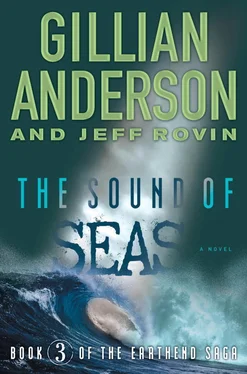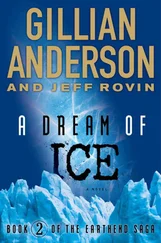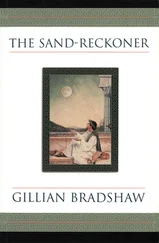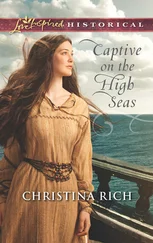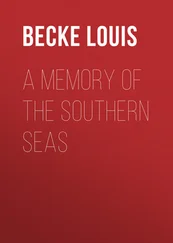“I have to go to work,” he said. He glanced at the clock on the night table. Caitlin had had it for decades, since they were students at NYU. It was not digital: the numbers flipped over on little plastic cards inside the white case. He missed his friend… he missed those days. There were times, like now, when he ached with that longing. “It’s six forty-five,” he said. “Caitlin’s parents will be here in an hour or so and I have an idea. I think. I will bring Madame Langlois and Enok to my place.”
“You’d trust them?”
“With what—my fridge and flat-screen? We can’t leave them with the O’Haras, so it’s either that or we turn them out.”
“I still vote for the latter,” Anita said hotly. “People who want to help… help . That’s what Caitlin did.”
She saw Ben’s sad eyes, quickly realized her mistake, and corrected herself. “That’s what Caitlin does . They don’t play games like our Vodou lady, they don’t talk without listening.” She continued in a softer voice. “Caitlin is a humanitarian. She doesn’t deserve what happened.”
“That’s a separate topic and there, at least, we agree,” Ben said. “But that doesn’t solve the immediate problem.”
Anita’s comments had sounded too much like a eulogy and Ben had to get away, not just emotionally and mentally but physically. He went back into the hallway to prepare to get the Langloises over to his East Side apartment near the United Nations. He looked in at Jacob again, resisted gathering up the boy’s drawings. Jacob and his mother shared a strong bond and there might be subtle, subliminal clues as to what happened. But the boy might wake and look for the sketches: in a world made suddenly very unstable, Ben wanted him to have at least that anchor. He left and headed back down the hall. Arriving in the living room, he swore through his teeth.
“What is it?” Anita asked, hurrying in.
“You got your wish,” he said, turning to the front door, pulling it open, and looking out into the empty hallway. “Madame Langlois and her son have left.”
Vilu lay sprawled on the hard-packed sand of the courtyard. He was lying on his back, his eyes shut, his mouth open.
Caitlin ran to him. Surrounded by slowly encroaching Galderkhaani, she forgot her own plight when she bent over him. For an instant, like the scrape of a knife along her breastbone, she felt that it was Jacob falling, needing her help, needing her comfort.
Lasha had followed with a bowlegged gait and a loud huffing. The other citizens were clustering tighter, trying to see what the woman was doing as she knelt over the prone boy.
“Is there a physician?” she asked Lasha.
The man looked back at the gathered faces. “Weta? Does anyone see Weta?”
“She is in the birth center!” someone shouted back.
“Run! Get her!” Lasha said then turned to Caitlin. “That building is at the far end of the village, away from the sea chill, and Weta is aged. It will take time.”
Time . It kept coming up, seemed to be Caitlin’s enemy in every possible way. She focused on the boy. She didn’t bother to explain that she was a doctor herself: what she wanted immediately for the boy was a bed, shelter, and someone to watch him after she did triage. Most likely they had herbs or compounds, though she didn’t know that any of them would work. Ancient medicines and cures were hit-and-miss. When they missed, they often made the patient worse.
She also prayed, audibly, under her breath, that her worst fears weren’t realized—that this was not a transference of souls.
Her first thought was that Vilu had suffered heatstroke or dehydration, and she told Lasha to bring water. Unbending with a grunt, the old man turned and scurried back to his hut for a ladle.
Motioning for people to step back and give Vilu air, Caitlin saw that he was perspiring and, feeling for his heartbeat, found it normal. So was his temperature—assuming that the Galderkhaani “normal” was the same as that of modern humans. It wasn’t heatstroke, but that forced open the door to those other, deeper concerns. Jacob had been reading Twenty Thousand Leagues Under the Sea . She prayed that that had nothing to do with what this boy had uttered, but in her heart she didn’t believe it.
He followed me here , she thought ominously. There can be no other explanation.
Lasha arrived with an alok , a wooden, short-handled ladle that he’d filled from the pool. Apparently, they knew nothing of bacteria or parasites in Galderkhaan. Nonetheless, she took it and wet the boy’s lips from a bony rim. He responded weakly and she put a hand behind his head to support him as he tried to take more. The feel of his hair seemed so familiar. Caitlin struggled to keep back deep, heaving sobs. But she could not help herself from looking down at the sweet face, the ruddy skin with just a hint of pale white freckles, the dark hair that fell in natural ringlets over a broad, innocent forehead. Caitlin used the sleeve of her loose-fitting tunic to dab away the sweat that was beading under his eyes and on his cheek.
His four-flippered friend waddled through the legs of the crowd.
“Shoo!” Lasha growled, kicking lightly at the thyodularasi.
Without taking her eyes from the boy, Caitlin passed the ladle to Lasha.
“What could have happened?” the old man asked, peering over her back.
“Excitement,” said a teenaged girl who was looking on. “He so loves the airship.”
“Then why did he say— what did he say?” Lasha asked. “Sybamurn?”
Caitlin realized with a jolt that the boy had spoken it in English; Lasha had uttered a Galderkhaani approximation.
“Submarine,” Caitlin clarified without thinking—also in English.
“What is that?” Lasha asked.
“I don’t know,” she said, trying to forestall any further questions. “That’s what I heard.”
The woman fanned the boy with an open hand, blew gently on the sweat, touched his warm flesh. She used her body to block the harsh sun. Someone yelled that Weta would come as soon as possible. Caitlin was considering what to do next when the crowd that had gathered parted slightly and a familiar figure returned, tugged along by the thyodularasi Lasha had chased away. Standor Qala patted the thigh-high creature on its elongated snout and it released its grip. She strode through the group and crouched beside the boy, beside Caitlin.
“It was all too much for Vilu, I see,” Qala remarked.
“This has happened before?” Caitlin asked.
“Not like this,” Qala admitted with a half-smile. “Usually he just jumps around. Ever since Femora Azha took the children aloft in a fisher’s airship, his life has been about flight.”
“There is no blood, no injury,” Qala said after reaching softly behind the boy’s head. “Do we know if he’d eaten?”
No one answered. Reaching into the sashlike pouch at her side, Qala withdrew an oval pellet that looked like a ruby and held it just below the boy’s nostrils. Qala adjusted it so the rays of the sun were striking it directly. The sunlight illuminated small, dark, opaline facets inside. Fragrance rose from the crystal, which began to decay as the scent grew stronger. Caitlin saw now that it was not mineral but vegetal, the surface made of petals crushed around slivers of what looked like dried berries. Oil dropped from the shrinking object, absorbed by the boy’s flesh, just under his nostrils.
The boy stirred but his eyes remained closed.
“Odd,” Qala remarked as the pellet finally fell to pieces. “I’ve seen the dumatta awaken those who were near death from drowning. This appears to be a different kind of sleep.”
Читать дальше
